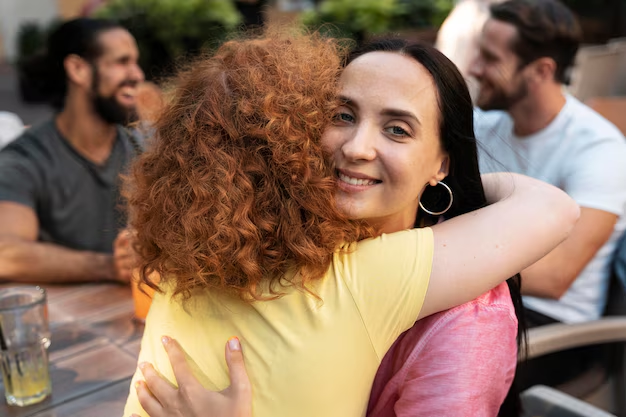Adult Friendship: How to Make Friends in 5 Steps
Ever look around and wonder where all the potential besties disappeared to? Making friends as a kid felt easy – shared interests in toys or playground games were enough. But adult friendship? It can feel like navigating a minefield. Jobs, families, and life in general get in the way. You’re not alone if you’re finding it tough to forge those meaningful connections.
Table of Contents
This article dives into the challenges of adult friendship and gives you practical, actionable steps to build a supportive and fulfilling social circle. Let’s get started!
Why is Making Friends So Hard as an Adult?

Let’s face it, the dynamics of making friends change drastically after graduation. Here’s why:
- Fewer Opportunities for Spontaneous Interaction: Remember school or college? You were surrounded by people your age, all day, every day. Now, your interactions are often limited to coworkers or other parents, and those interactions might be superficial.
- Established Routines and Priorities: Life gets busy! Work, family obligations, and personal responsibilities leave less time and energy for socializing. It’s easy to prioritize other things over building new friendships.
- Fear of Rejection: Putting yourself out there can be scary. The fear of being rejected or misunderstood can hold you back from initiating connections. It’s a vulnerable feeling, and no one enjoys it.
- Shifting Identities and Interests: As you grow, your interests and values may change. This can lead to drifting apart from old friends and make it harder to find common ground with new people.
- The “Already Have Enough Friends” Mindset: Some people already feel content with their existing social circle and aren’t actively seeking new friendships. This isn’t a bad thing, but it can make it harder to break into established groups.
The Impact of Social Media on Adult Friendship
While social media can help you stay connected with existing friends, it can also create a false sense of connection and make it harder to form genuine, in-person relationships. Scrolling through feeds isn’t the same as having a heart-to-heart conversation over coffee.
| Advantage | Disadvantage |
| Easy to stay in touch with distant friends. | Can lead to superficial connections. |
| Discover groups with shared interests. | Creates a fear of missing out (FOMO). |
| Opportunity to reconnect with old acquaintances. | May discourage real-life interactions. |
5 Steps to Cultivating Meaningful Adult Friendship

Okay, enough about the problems. Let’s get to the solutions! Here’s a step-by-step guide to building fulfilling friendships as an adult:
Step 1: Identify Your Needs and Interests
What are you looking for in a friend? Companionship? Support? Someone to share your hobbies with? Understanding your own needs is the first step in finding the right people. Also, think about your interests. What do you enjoy doing? What are you passionate about? These are the things that will naturally draw you to like-minded people.
- Journaling: Spend some time reflecting on your current social circle (or lack thereof). What’s missing? What do you crave?
- List Your Hobbies: Make a list of everything you enjoy doing, from hiking to knitting to attending book clubs.
- Consider Your Values: What qualities are important to you in a friend? Honesty? Loyalty? A good sense of humor?
Step 2: Put Yourself Out There
This is where the rubber meets the road. You can’t make friends sitting at home! You need to actively seek out opportunities to meet new people. This might feel uncomfortable at first, but the rewards are worth it. Join clubs, take classes, volunteer, attend local events. The possibilities are endless!
- Join a Meetup Group: Search for groups related to your interests on Meetup.com.
- Volunteer: Find a cause you care about and volunteer your time. It’s a great way to meet people who share your values.
- Take a Class: Learn a new skill and meet like-minded individuals.
- Attend Local Events: Check your local community center or library for upcoming events.
Step 3: Initiate Conversations and Show Genuine Interest
Meeting people is only half the battle. You also need to be able to strike up conversations and build rapport. Ask open-ended questions, listen actively, and show genuine interest in what others have to say. Remember, people love to talk about themselves! Small talk is fine to start, but don’t be afraid to delve deeper and share your own experiences and thoughts.
- Ask Open-Ended Questions: Instead of asking “Do you like this event?” try “What’s your favorite part about this event?”
- Listen Actively: Pay attention to what the other person is saying, and respond thoughtfully.
- Share Your Own Experiences: Don’t be afraid to open up and share your own thoughts and feelings.
- Find Common Ground: Look for shared interests or experiences to build a connection.
Step 4: Nurture the Connection
You’ve met someone you click with – great! Now, it’s time to nurture that connection. This means making an effort to stay in touch and deepen the relationship. Invite them for coffee, suggest a movie night, or simply send a text to check in. Consistency is key.
- Follow Up After Meeting: Send a quick text or email to say you enjoyed meeting them.
- Suggest a Specific Activity: “Want to grab coffee next week?” is more effective than “We should hang out sometime.”
- Be Consistent: Make an effort to stay in touch, even when you’re busy.
- Be Reliable: If you make plans, stick to them.
Step 5: Be Patient and Persistent
Building meaningful friendships takes time. Don’t get discouraged if it doesn’t happen overnight. Be patient, persistent, and keep putting yourself out there. Not every connection will blossom into a deep friendship, and that’s okay. The important thing is to keep trying and to be open to new possibilities. Remember that friendships evolve, and sometimes people drift apart. That doesn’t mean you’ve failed; it just means it’s time to focus on the friendships that are still thriving.
Dealing with Challenges in Adult Friendship

Friendships aren’t always smooth sailing. Here’s how to navigate some common challenges:
- Conflict: Disagreements are inevitable. Address them openly and honestly, with respect for the other person’s perspective.
- Distance: Life changes can lead to physical distance. Make an effort to stay connected through phone calls, video chats, or occasional visits.
- Different Life Stages: When friends are at different stages in their lives (e.g., marriage, parenthood), it can be harder to relate. Focus on shared values and interests, and be understanding of each other’s priorities.
- Toxic Friendships: Sometimes, it’s necessary to let go of friendships that are draining or harmful. Prioritize your own well-being.
The Importance of Adult Friendship for Your Well-being
Strong friendships aren’t just nice to have – they’re essential for your physical and mental health. Studies have shown that having close friends can reduce stress, improve your immune system, and even extend your lifespan. Friends provide emotional support, a sense of belonging, and opportunities for fun and laughter. They can help you cope with challenges, celebrate successes, and feel more connected to the world around you. Don’t underestimate the power of a good friend!
FAQ About Adult Friendship
Here are some frequently asked questions about navigating adult friendships:
- Is it normal to find it hard to make friends as an adult? Absolutely! As discussed earlier, many factors contribute to the challenges of adult friendship. You’re definitely not alone.
- How do I deal with a friend who is always negative? Set boundaries. Limit your exposure to their negativity, and encourage them to seek professional help if needed.
- How do I know if a friendship is toxic? If a friendship consistently leaves you feeling drained, insecure, or unhappy, it may be toxic.
- What if I’m introverted? Can I still make friends? Absolutely! Introverts can make great friends. Focus on building deeper connections with a smaller number of people.
- How can I reconnect with old friends? Reach out! Send a text, email, or social media message. Suggest a phone call or a coffee date.
Conclusion: Nurturing Your Social Circle
Making friends as an adult might require effort, but it’s an investment that pays off in countless ways. By understanding the challenges, putting yourself out there, and nurturing your connections, you can build a supportive and fulfilling social circle that enriches your life. Don’t be afraid to take the first step – you never know where it might lead!
Now, we want to hear from you! What are your biggest challenges when it comes to making friends as an adult? Share your thoughts and experiences in the comments below! And if you found this article helpful, please share it with your friends!

